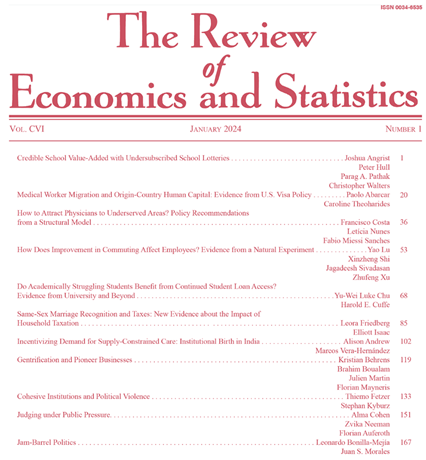毛里求斯的教育不匹配和工资:奖励或惩罚
IF 7.6
1区 经济学
Q1 ECONOMICS
引用次数: 0
摘要
摘要本文研究了毛里求斯教育错配与工资之间的关系。通过将毛里求斯作为非洲的案例研究,该研究增加了关于教育错配和劳动力市场结果的现有文献。在非洲,过度教育日益受到关注,毕业生很难找到与他们的教育水平和领域相匹配的工作,即所谓的纵向和横向错配。这种供需不足是由多种因素造成的,其中一种因素可称为“文凭病”。利用2013年至2017年的连续多用途家庭调查,汇总估计结果发现,与完全匹配的工人相比,受教育程度过高的个人的工资损失为1.3%。与完全匹配的工人相比,受教育程度低的工人的工资损失约为9.6%。采用Heckman两步估计方法来解释样本选择偏差,同时采用工具变量两阶段最小二乘法来满足过度教育的内生性。在Heckman估计方法下,过度教育和教育不足的工资惩罚与普通最小二乘估计相比,工资惩罚的幅度略有不同。一旦我们考虑到内生性,受教育程度过高的工人的工资惩罚上升到11%,而受教育程度过高的工人的工资惩罚没有改变。本文章由计算机程序翻译,如有差异,请以英文原文为准。
Education Mismatch and Wages in Mauritius: Premium or Penalty
Abstract The paper investigates into the link between education mismatch and wages in Mauritius. It adds to the existing literature on education mismatch and labour market outcomes by using Mauritius as a case study in Africa, where overeducation is a growing concern, with graduates struggling to find jobs corresponding to their education level and field, the so-called vertical and horizontal mismatches. This supply-demand inadequacy ascends from a mix of factors and one of them can be termed as the ‘diploma disease’. Using the Continuous Multi-Purpose Household Surveys from 2013 to 2017, the pooled estimation results find evidence for a wage penalty of 1.3% for overeducated individuals compared to perfectly matched workers. A wage penalty of around 9.6% is also noted for undereducated workers compared to their perfectly matched counterparts. Heckman two step estimation approach is adopted to account for sample selection bias whilst the instrumental variable two stage least squares is applied to cater for the endogeneity of overeducation. The wage penalty for overeducation and undereducation under Heckman estimation method compares to ordinary least squares estimates with slight differences in the magnitude of the wage penalty. Once we account for endogeneity, the wage penalty for overeducated workers rose to 11% while that of overeducation did not change.
求助全文
通过发布文献求助,成功后即可免费获取论文全文。
去求助
来源期刊

Review of Economics and Statistics
Multiple-
CiteScore
8.50
自引率
0.00%
发文量
175
期刊介绍:
The Review of Economics and Statistics is a 100-year-old general journal of applied (especially quantitative) economics. Edited at the Harvard Kennedy School, the Review has published some of the most important articles in empirical economics.
 求助内容:
求助内容: 应助结果提醒方式:
应助结果提醒方式:


